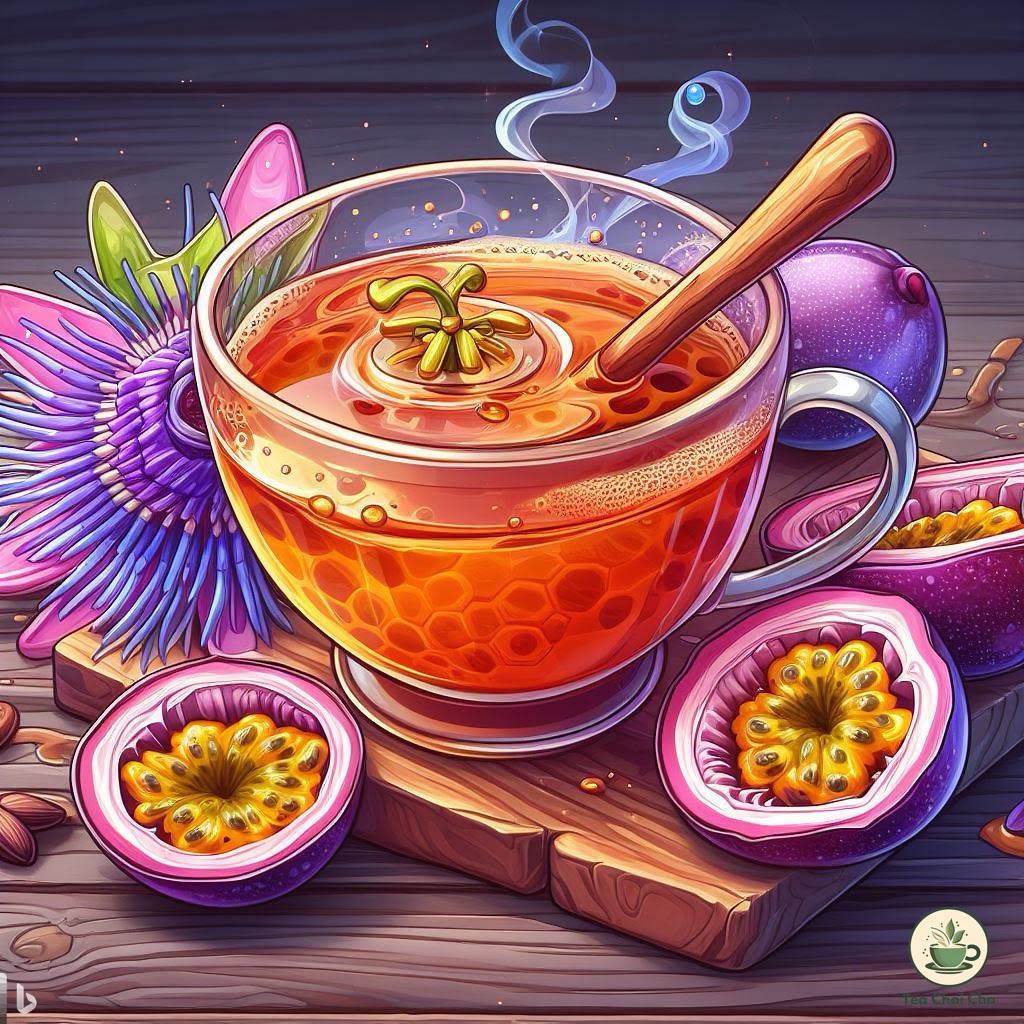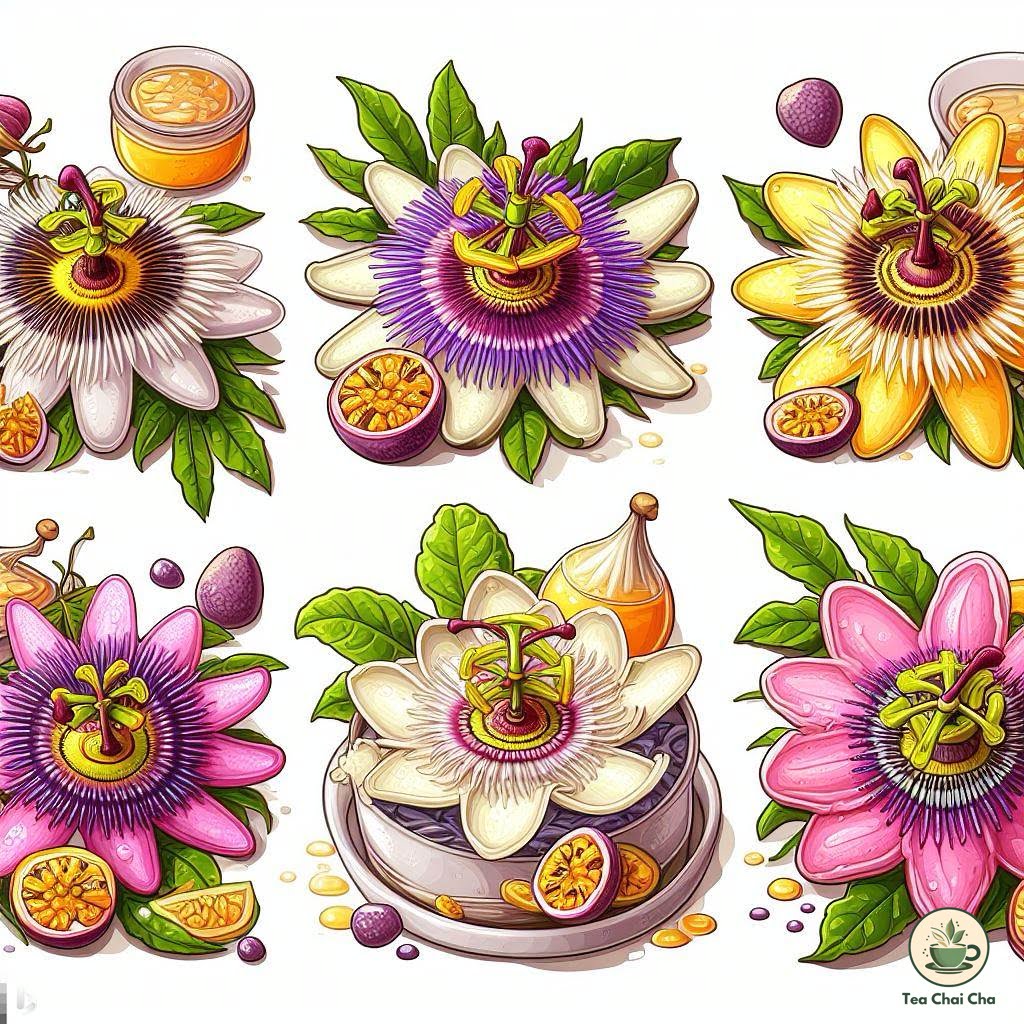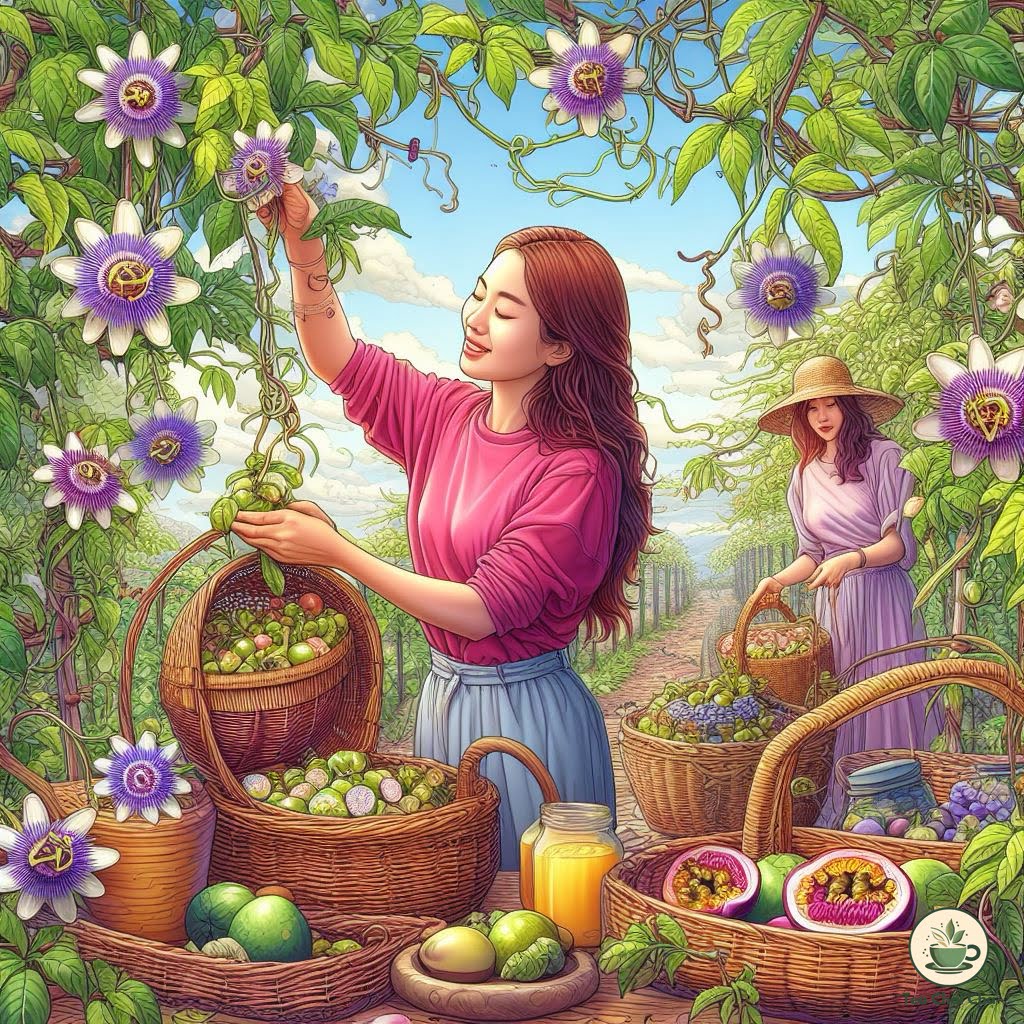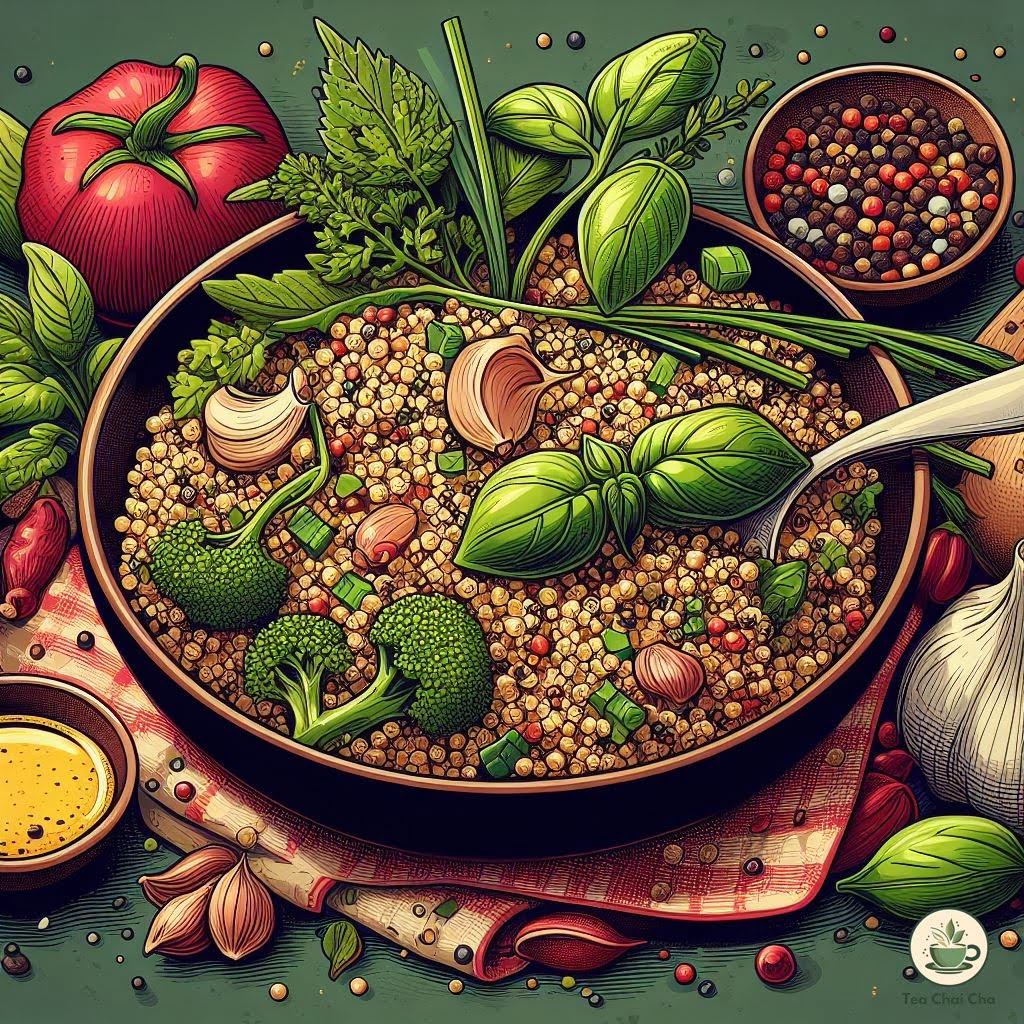The name “Passion Flower Tea” led you to imagine a tea filled with captivating floral notes, but when you took your first sip, it felt like the petals didn’t quite bloom.
Now you want to learn if passion flower tea is really meant to taste like that or is it JUST YOUR tea that deceived you!
So, what does passion flower tea taste like?
Passion flower tea has a mild, earthy flavor with herbal undertones. It’s not overly sweet and doesn’t have the tanginess associated with some fruity teas. Instead, you’ll notice a subtle bitterness that is well-balanced.
The flavor is often subtle and grassy, similar to a blend of green tea and mild chamomile, but with a slightly more pronounced earthiness.
Some describe its taste as nutty or woody, but it’s generally gentle and soothing on your palate.
One thing is for sure, passion flower tea does not taste anything like the smell of passion flowers.
But that’s not it, I have many aspects of this herbal tea’s taste to talk about in the next sections (with some harvesting tips, and yummy food pairings)!

Is Passion Flower Tea Same As Passion Tea?
Passion Flower Tea is not the same as Passion Tea, and it’s important to understand the difference.
Passion Tea is a unique herbal tea blend that’s well-loved for its refreshing qualities, often enjoyed during the summer.
It includes ingredients like
- Hibiscus flowers
- Rosehips
- Citric acid
- Natural tropical flavors
- Lemongrass
- Orange peel
- Cinnamon
- Licorice root
- Fruit juice extract for color

What Does Passion Tea Taste Like?
Passion tea is known for its bold and vibrant flavors. It has a tart and fruity taste, primarily influenced by its main ingredients: hibiscus flowers, rosehips, and lemongrass. You can expect a refreshing and slightly tangy profile with a pleasant, tropical twist.
Overall, passion tea has a fruity and slightly tart taste that’s both sweet and sour. It’s a popular choice for those who enjoy a bright and zesty beverage.
On the other hand, Passion Flower Tea is a separate herbal tea made primarily from the passion flower plant, scientifically known as Passiflora incarnata.
It’s distinct from the proprietary blend called Passion Tea.
Passion flower tea does not contain the same ingredients as Passion Tea and has a different taste and purpose.
People often consume Passion Flower Tea for its potential calming and relaxation properties due to the natural compounds found in the passionflower.

Why Does Passion Flower Tea Taste So?
Passion flower tea gets its unique taste from the natural compounds in the passion flower plant.
When you sip this tea, you’re experiencing the distinct flavors created by flavonoids, alkaloids, and essential oils in the plant.
The flavonoids bring a slightly bitter and earthy taste to the tea.
They’re the ones responsible for the tea’s bitterness and astringency, giving it an herbaceous touch that might stand out to your taste buds.
You can thank the alkaloids like harmine and harmaline for the extra bitterness and earthiness in your cup.
They add their unique flavors to the mix, contributing to the overall taste.
The essential oils in the passion flower plant contain aromatic compounds that give the tea its gentle floral and sweet hints.
These compounds add a delicate, almost perfume-like fragrance, enriching the overall taste of the tea.
5 Different Tastes of Passion Flower Tea
As you sip on a cup of Passion Flower Tea, you’ll quickly notice that it offers a spectrum of distinct tasting notes.
The fascinating thing is that these flavors have their roots in the natural compounds present within the passion flower plant.
1. Floral and Earthy
When you enjoy Passion Flower Tea, you’ll experience a delightful blend of floral and earthy notes.
This soothing taste is a direct result of volatile compounds such as esters and terpenes.
These compounds bring forth the tea’s subtle natural sweetness, akin to fresh flowers.
2. Herbal and Grassy
Some brews of Passion Flower Tea reveal herbal and grassy undertones.
These nuances stem from terpenoids and flavonoids naturally occurring in the passion flower, adding a refreshing and slightly vegetal quality to your tea.
3. Mild Citrus and Tartness
At times, your Passion Flower Tea may surprise you with hints of mild citrus and a touch of tartness.
This zestiness is due to organic acids like malic and citric acid, which introduce a tangy dimension to the flavor.
4. Nuttiness and Creaminess
You might also notice a subtle nutty and creamy aspect in your tea.
This comforting note is a result of the fatty acids and lipids present in the passion flower plant, providing a creamy and soothing element.
5. Spice and Warmth
The spicy and warm characteristics can be linked to alkaloids like harmaline present in passion flower.
These compounds add a unique kick to the taste, appealing to those who enjoy a bit of spice in their beverages.

What Do Different Passion Flower Teas Taste Like?
Passion flower teas are known for their distinctive taste profiles, and the flavors can vary depending on the specific passion flower used.
Here, you’ll discover what different passion flower teas taste like.
1. Passiflora Incarnata (Maypop) Tea
Maypop tea offers a mild, delicate, and floral taste.
It’s characterized by subtle notes of wildflowers and a touch of sweetness.
This tea has a gentle, calming flavor that’s perfect for relaxation.
2. Passiflora Edulis (Purple Passion Fruit) Tea
Purple passion fruit tea is a burst of tropical sweetness.
It has a rich, fruity taste with a tangy edge, reminiscent of the ripe passion fruit itself.
The flavor is invigorating and makes for a refreshing beverage.
3. Passiflora Ligularis (Sweet Granadilla) Tea
Sweet granadilla tea offers a delightful tropical experience with a citrusy twist.
It’s both sweet and slightly tangy, creating a balanced flavor profile that is a treat for the taste buds.
4. Passiflora Quadrangularis (Giant Granadilla) Tea
Giant granadilla tea is known for its mild and subtle taste.
It has a gentle, slightly sweet flavor with hints of cucumber and melon.
This tea provides a soothing, mellow taste.
5. Passiflora Laurifolia (Water Lemon) Tea
Water lemon tea is characterized by its zesty and tart flavor.
It has a pronounced citrus taste with a slightly sour note.
This tea is refreshing and awakening, perfect for those who enjoy tangy beverages.
6. Passiflora Caerulea (Blue Passion Flower) Tea
Blue passion flower tea has a mild, smoky, and earthy flavor.
It’s not overly sweet but rather has herbal undertones with a subtle hint of nuttiness.
This tea offers a soothing, grounded taste.

6 Tips to Pick the Best Tasting Passion Flowers for Tea
When it comes to enjoying a delightful cup of passion flower tea, the quality of the passion flowers you choose plays a crucial role.
To ensure you’re getting the best-tasting passion flowers for your tea, here are some expert tips to guide your selection:
1. Opt for Fresh, Young Buds
Choose fresh and young passion flower buds when selecting flowers for tea.
These buds tend to have a milder, more pleasant flavor compared to older, mature flowers.
Young buds are often sweeter and less bitter, resulting in a more enjoyable tea experience.
2. Consider the Variety
Pay attention to the passion flower variety you are using.
Different species of passion flowers can have varying flavor profiles.
For a sweeter taste, consider Passiflora incarnata or Passiflora ligularis, while Passiflora edulis might offer a more tart and tangy flavor.
Select the variety that aligns with your taste preferences.
3. Check for Pesticide-Free Flowers
Chemical residues can impact the taste and quality of your tea.
When purchasing or harvesting passion flowers, ensure they have not been treated with harmful pesticides.
Organic passion flowers are an ideal choice.
4. Harvest at the Right Time
Harvest your passion flowers at the optimal time.
The best time to harvest passion flowers for tea is when they are fully mature but not overripe.
Look for flowers with vibrant colors and a fresh fragrance.
Overly ripe flowers may have a bitter taste.
5. Avoid Damaged or Wilted Flowers
Discard any damaged, wilted, or discolored flowers during the selection process.
Only choose passion flowers that are in excellent condition.
Damaged flowers can negatively impact the taste of your tea.
6. Trust Your Senses
Before you brew your passion flower tea, take a moment to smell the flowers.
They should have a pleasant, floral aroma.
If the scent is off-putting or unusual, it may indicate that the flowers are not suitable for making tea.

Do All Types of Passion Flowers Make Tasty Tea?
Not all passion flower species are used for making tea.
The most popular choice is Passiflora incarnata (Maypop) for its delicate, floral taste.
Others, like Passiflora edulis (Purple Passion Fruit) and Passiflora ligularis (Sweet Granadilla), offer tropical flavors that can be refreshing.
However, some species are less common for tea, like Passiflora quadrangularis (Giant Granadilla), Passiflora laurifolia (Water Lemon), and Passiflora caerulea (Blue Passion Flower).
Remember to check if the species you choose is safe for consumption.
Passion flowers are generally safe but ensure suitability before making tea.
What Flavors Pair Well with Passion Flower Tea
If you’re enjoying a cup of passion flower tea and wondering what dishes compliment its unique flavor, here are some options to consider:

1. Light and Fresh Salads
Opt for salads that feature crisp, fresh ingredients like mixed greens, cucumber, and cherry tomatoes.
The mild, herbal notes of Passion Flower Tea harmonize with the natural flavors of the salad.
A light vinaigrette or lemon-based dressing can enhance the pairing.

2. Mild White Fish
When preparing white fish like tilapia or cod, consider baking or grilling with minimal seasoning.
The gentle taste of these fish varieties allows the floral essence of Passion Flower Tea to shine.
Add a squeeze of lemon and a pinch of salt for a delightful combination.

3. Lemon Desserts
For a satisfying end to your meal, lemon-based desserts such as lemon bars or lemon pound cake are a fantastic choice.
The citrusy zing of lemon resonates well with the floral notes in Passion Flower Tea, creating a balanced and refreshing pairing.

4. Herbed Quinoa
You may want to try pairing Passion Flower Tea with a side of herbed quinoa.
The earthy, nutty flavor of quinoa complements the tea’s gentle earthiness, while herbs like basil, parsley, or chives add a layer of complexity.

5. Fresh Fruit Salad
Opt for a medley of fresh fruits like strawberries, blueberries, and kiwi.
The natural sweetness of the fruits pairs beautifully with the floral nuances of Passion Flower Tea.
It’s a healthy and revitalizing combination.

5 Teas That Taste like Passion Flower Tea
If you’re looking for teas that share the same taste profile (plus calmness) as passion flower tea, there are a few options you might want to explore.
1. Chamomile Tea
Chamomile tea is known for its soothing and calming qualities.
It offers a gentle, slightly floral flavor with a hint of sweetness, somewhat reminiscent of passion flower tea.
This caffeine-free herbal tea can help you unwind and relax.
2. Lavender Tea
Lavender tea features a floral and slightly earthy taste, which may remind you of the delicate notes in passion flower tea.
It’s often enjoyed for its calming properties, making it a great choice for relaxation.
3. Valerian Root Tea
Valerian root tea has an earthy, herbal flavor that shares some similarities with passion flower tea’s natural taste.
It is well-known for its potential to promote relaxation and reduce stress.
4. Lemon Balm Tea
Lemon balm tea offers a lemony, citrusy flavor with a touch of herbaceous notes.
While it’s not identical to passion flower tea, its soothing properties can be quite appealing for those seeking a calming cup of tea.
5. Linden Flower Tea
Linden flower tea has a mild, floral taste with a touch of sweetness.
It shares some subtle flavor notes with passion flower tea and is believed to have relaxing properties.
Did you already know passion tea and passion flower tea are not the same? Let me know below!

